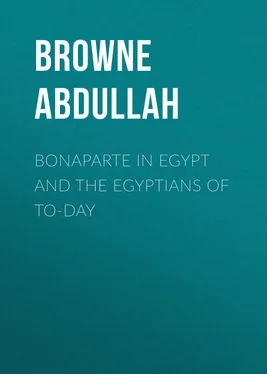Abdullah Browne - Bonaparte in Egypt and the Egyptians of To-day
Здесь есть возможность читать онлайн «Abdullah Browne - Bonaparte in Egypt and the Egyptians of To-day» — ознакомительный отрывок электронной книги совершенно бесплатно, а после прочтения отрывка купить полную версию. В некоторых случаях можно слушать аудио, скачать через торрент в формате fb2 и присутствует краткое содержание. Жанр: Историческая проза, foreign_antique, foreign_prose, foreign_language, на английском языке. Описание произведения, (предисловие) а так же отзывы посетителей доступны на портале библиотеки ЛибКат.
- Название:Bonaparte in Egypt and the Egyptians of To-day
- Автор:
- Жанр:
- Год:неизвестен
- ISBN:нет данных
- Рейтинг книги:4 / 5. Голосов: 1
-
Избранное:Добавить в избранное
- Отзывы:
-
Ваша оценка:
- 80
- 1
- 2
- 3
- 4
- 5
Bonaparte in Egypt and the Egyptians of To-day: краткое содержание, описание и аннотация
Предлагаем к чтению аннотацию, описание, краткое содержание или предисловие (зависит от того, что написал сам автор книги «Bonaparte in Egypt and the Egyptians of To-day»). Если вы не нашли необходимую информацию о книге — напишите в комментариях, мы постараемся отыскать её.
Bonaparte in Egypt and the Egyptians of To-day — читать онлайн ознакомительный отрывок
Ниже представлен текст книги, разбитый по страницам. Система сохранения места последней прочитанной страницы, позволяет с удобством читать онлайн бесплатно книгу «Bonaparte in Egypt and the Egyptians of To-day», без необходимости каждый раз заново искать на чём Вы остановились. Поставьте закладку, и сможете в любой момент перейти на страницу, на которой закончили чтение.
Интервал:
Закладка:
A week having passed by without the appearance of an enemy, the people had regained their wonted calm, when as unexpectedly as though no warning had been given of its coming the French fleet of twenty-one vessels of war and over three hundred transports was seen in the offing heading for the port. This sudden and unlooked-for proof of the reality of the danger they had refused to credit produced the utmost consternation.
Once more the Governor despatched messengers in all haste to the capital, and describing the French fleet as one "without beginning or end," begged earnestly, but all too late, for aid.
The people of Cairo, like those of Alexandria, when their first alarm at the arrival of Nelson's fleet had passed away, seeing in his departure a confirmation of their own conception of his visit, ceased to think of the matter save as the subject of jest, but were overwhelmed with dismay at the new alarm, even the Government, which had been but little moved by the first, being now stirred to activity and a sense of danger.
The Government of Egypt was then, at least nominally, such as it had been constituted after the Turkish conquest in 1517 by Sultan Selim. Keenly recognising the impossibility of enforcing his authority in a province of the Empire so far off and so difficult of access from his own capital, the Sultan had, not unwisely, contented himself with organising a system of government that was, in his opinion, the one most likely to ensure the permanency of his sovereignty and guarantee him the receipt of a goodly share of the wealth of his new possession. Egypt was placed, therefore, as the other provinces of the Empire then were, and still are, under the government of a Pacha, who was in effect, though he was accorded neither the style nor the honour of that rank, a viceroy. But the Sultan, anxious to hold the Pacha in check by some power ever present and active, divided the territory under his charge into twenty-four districts, and placed each of these, as a kind of local governorship, in the hands of a Mamaluk chief or Bey. Of the Beys chosen for these posts seven were to form a Dewan, or Council of State, nominally to advise and assist, but in reality to control the Pacha, whose decisions this Council was empowered to veto. All real power was therefore vested in the Mamaluks, who, it is perhaps scarcely necessary to recall, were the troops that, originally brought into the country as slaves by the Fatimite Caliphs, had gradually developed their power and influence until their chiefs had become feudal lords, holding lands and keeping, according to their individual means, troops of mounted followers, whose physical qualities and effective training rendered them one of the finest bodies of cavalry that has ever existed. As must invariably happen when a weak and incompetent Government seeks the aid of slaves or mercenaries to sustain its failing dominion, the Mamaluks had eventually acquired such power that they were enabled to usurp the government of the country, and had, as we have seen, maintained their position as Sultans of Egypt from the time of Salah ed Deen up to the Turkish conquest. Under the system of government established by the Sultan Selim, though unable to regain the absolute independence they had lost, they soon recovered almost all their former influence and power, and as they controlled the military strength of the country, the small Turkish garrison being quite helpless to oppose them, they soon became, as before, the real rulers of the land. Being invariably foreigners, or the immediate descendants of foreigners, Circassians, Armenians, or other slaves, it was but natural that these Beys should have no sympathy for the people of the country, and, with the arrogance characteristic of a military body that has attained political power, despised all outside of their own ranks, and held it a disgrace to intermarry with the Egyptians. Actuated by none but the most selfish aims, they sought and cared for nothing but their own interests, each of them being a veritable Ishmael, looking upon all men as his enemies, only accepting the co-operation of his fellow Mamaluks as a necessary measure of defence, confiding in the loyalty of his immediate followers only so far as he was able to control them by rendering their faithfulness to him conducive to their own interests. Among themselves they of necessity accepted the domination of the one who by force of arms, intrigues, or other favouring circumstances, was in a position to enforce his will against that of the others, and, as might be expected, the Bey who held this prominent position was the one to whom the post of Sheikh el Beled, or Governor of Cairo, was accorded, that being the post of all others the most coveted by them, this Bey being, in practice, the real Governor of the country, his power being only limited by the necessity he was under of consulting and conciliating the wishes of the other members of the Dewan.
It may seem strange that with the power they thus possessed the Mamaluks should continue to offer even a faint show of respect to the Pacha, or of loyalty to the Empire, for light as was the yoke these laid upon them, it was sufficiently galling to men who lived as they did each wholly absorbed in the prosecution of his own personal aims and interests, and the more so that, as the wealth of the country declined under their greedy and ruthless rule, the remittances of revenue exacted by the Sultan was a yearly draft that seriously limited their resources. But if the Mamaluk hated and despised all men not of his own class, he was in turn hated by all others with a hatred all the fiercer and more bitter that it had no outlet. Thus, with no friend upon whom he could rely save his own right arm, the Mamaluk chief, however powerful, was fain to accept the patronage of the Sultan as the only aid he could look for in his combat with the world, and he must needs, therefore, be content to pay for that aid with a certain tribute of grudging loyalty. Nor must it be forgotten that, ever ready to combine and co-operate against a common foe, each Mamaluk was equally ready to turn his hand and sword against his fellow if thereby he might gain aught for himself. Had it not been for the mutual distrust the knowledge of this fact forced upon them, they might easily have regained the independence wrested from them by the Turks. This had, indeed, been momentarily accomplished by Ali Bey, who, in 1766, not only succeeded in setting himself up as Sultan of Egypt, but aspiring to extend his rule, had attacked and conquered the Mahomedan holy cities of Mecca and Medina in Arabia. His triumph was, however, but shortlived, for Mahomed Bey, the most trusted of his favourites, to whom he had confided the command of an army for the conquest of Syria, abandoned his task, and revolting, took his master Ali prisoner by a treacherous ambush. Unable alone to maintain the power he had thus for the moment seized, the traitor at once tendered his submission to the Sultan, and was, in reward for his "fidelity," appointed Pacha of Egypt. His tenancy of this office was, however, but brief, his death soon after, leaving the country once more a prey to the mutual rivalries of the Beys. In the contest for supremacy that followed, two of these, freed slaves of his, though constantly opposed to and frequently in arms against each other, eventually agreed to share the power between them, the one, Murad Bey, becoming the military chief of the Mamaluks, and the other, Ibrahim Bey, the Sheikh el Beled.
Under the joint sway of these two men the country enjoyed a brief period of greater quiet and peace than it had known for a long time, and although the tyranny and oppression from which they suffered was little if at all abated, the people had been so completely despoiled before and had so little to lose that, as "He that is down need fear no fall," they had but small anxiety for the morrow.
Читать дальшеИнтервал:
Закладка:
Похожие книги на «Bonaparte in Egypt and the Egyptians of To-day»
Представляем Вашему вниманию похожие книги на «Bonaparte in Egypt and the Egyptians of To-day» списком для выбора. Мы отобрали схожую по названию и смыслу литературу в надежде предоставить читателям больше вариантов отыскать новые, интересные, ещё непрочитанные произведения.
Обсуждение, отзывы о книге «Bonaparte in Egypt and the Egyptians of To-day» и просто собственные мнения читателей. Оставьте ваши комментарии, напишите, что Вы думаете о произведении, его смысле или главных героях. Укажите что конкретно понравилось, а что нет, и почему Вы так считаете.












